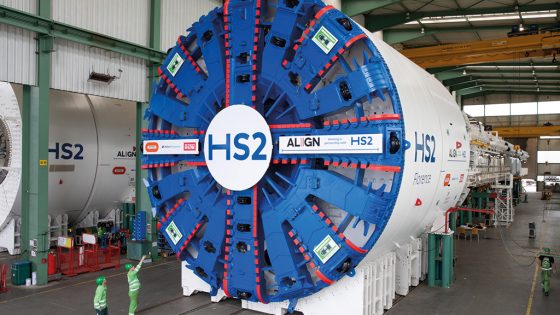Ducking out of big infrastructure decisions in the next year could leave the UK’s regional growth plans “in jeopardy”, the National Infrastructure Commission (NIC) has warned.
The commission said the “window is closing” to narrow the gap between the UK and other nations around regional connectivity, in its latest annual review.
In particular, it pointed to a lack of planning around the funds available from the cancellation of HS2’s northern leg, and plans for the Euston terminal.
“Our overall conclusion is the progress over the past 12 months has been mixed – good in parts and weak in others,” NIC chair John Armitt told a press briefing ahead of the report’s release.
“If we don’t want to delay the benefits for the UK public, our economy and our environment, ducking big decisions over the next 12 months will put the major goals of net zero, regional economic growth and the environmental protection in jeopardy,” he stressed.
“Specifically, [the government’s decisions] will determine whether the UK meets its own goals for growing regional economies, decarbonising the electricity grid, and making the economy more resilient to climate change.”
The government’s handling of HS2 came in for particular scrutiny, at both ends of the line.
At Euston, the commission stressed the “importance” of securing funding for the tunnel from Euston to Old Oak Common to “avoid incurring greater costs from stopping and restarting work for this vital link”.
Earlier this month the government announced it would release upfront costs for the tunnel, after it spent months trying to get the private sector to invest in the tunnel system. It hopes to recoup the money from the private sector later on.
The NIC also warned of a “critical gap” in infrastructure north of a proposed Handsacre junction in Staffordshire, which it said will “limit growth in capacity for new passenger or freight services without new infrastructure investment”.
The junction will eventually connect HS2 to the existing West Coast Main Line, under plans developed in October.
But the NIC warned “key corridors” such as between Birmingham and Manchester and in the North West will remain “poorly served”.
The plans north of Handsacre junction represented a “do-nothing scenario”, the NIC added.
The commission further pushed for more devolution to areas including London, where it noted Transport for London lacks a five-year devolved transport settlement, which Armitt said it “needs to plan for the future”.
“More broadly, a pipeline of mass transit schemes needs to be agreed with the biggest city regions, who are likely to face a capacity crunch in the coming years,” he added.
Northern Powerhouse Partnership chief executive Henri Murison said the NIC was right to highlight the need for investment in rail north of the Handsacre junction.
“The current plan to do nothing, as set out in the Network North programme, is not viable as it restricts growth between both Manchester and Leeds with Birmingham.
“We are clear that the government’s decision to leave this as an unfunded liability is not a responsible or sustainable position.”
He added there was a “strong case” for using Northern Powerhouse Rail as the “answer to much-needed connectivity improvements”.
A government spokesperson said it was giving “more powers” to cities to build vital transport links.
“And we’re building on this by setting out our long-term plan for transport through our £36bn Network North plan, while putting billions more investment into the low-carbon transition, including through our Boiler Upgrade Scheme – which is one of the most generous in Europe.”

